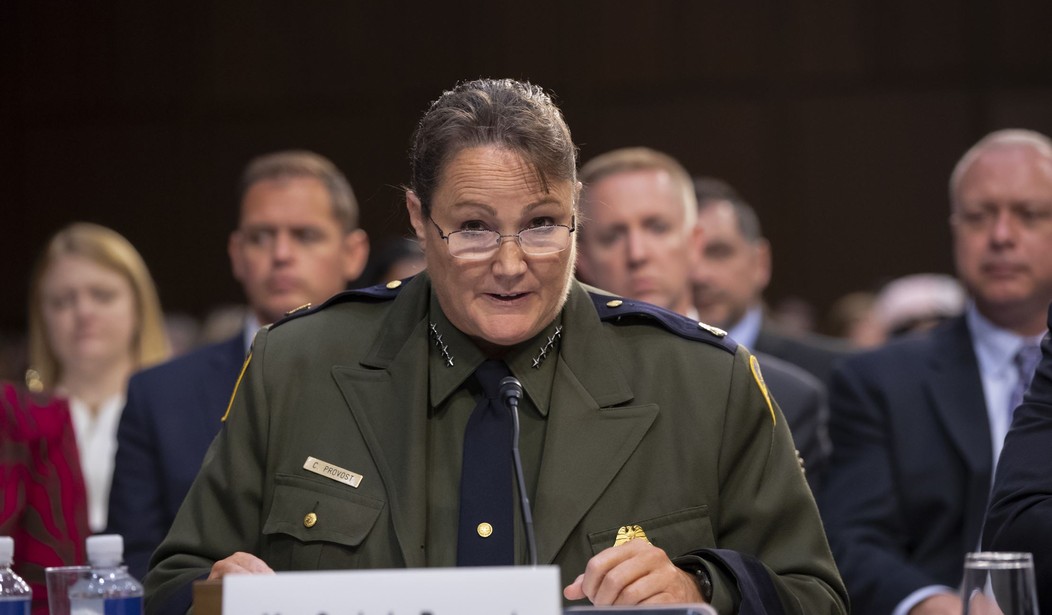Carla L. Provost, chief of the United States Border Patrol, testified before Congress on Thursday to discuss the ongoing illegal immigration crisis and humanitarian efforts conducted by US Border Patrol agents. While on the Hill, Provost told Congress that the Border Patrol is short on manpower, sacrificing time with their families, and is being stretched thin which leads to narcotics trafficking and other national security risks due to unchecked illegal aliens crossing over the Southern border into the country. As for what to do about this, the Border Patrol chief urged the government to enforce the law and have consequences for those who break it.
Increasingly, record numbers of illegal aliens and asylum seekers have swarmed the border. This has forced Border Patrol to work in overdrive just to keep up with the pace of those coming into the United Staes. The impact, while financially draining, has affected the men and women of Border Patrol in other ways, too.
“This crisis...is certainly having an impact on my men and women," Provost testified. "The hours that they are working, the things that they are seeing, the time it has taken them away from their family. This is like no other crisis that I have seen in my career in the humanitarian side of the house. I am extremely impressed by their resiliency but they are working long hours, many of them are detailed away from home supporting.”
"I have been forced to divert 40 to 60 percent of border patrol's manpower away from the border as we process and care for nearly 435,000 families and children that have flooded across our Southern border so far this year," she remarked.
"Think about the number of agents that must abandon their posts to assist when a group of over 1,000 illegal aliens walk into the U.S. at four o'clock in the morning," the first female border chief told lawmakers. "This happened just last month and it set a record in the 95 year history of the border patrol."
Recommended
When something like this occurs, drug cartels and other criminals bringing in deadly substances into the United States take advantage of the border's weak spots.
"It's pulling my manpower away from the border security mission and I can tell you the smugglers are certainly taking advantage of that. While my men and women are dealing with the humanitarian crisis," Provost said before lawmakers. "They will run a large group of people and while my agents are distracted dealing with that, they are running narcotics in other areas, and this is a tactic they use.”
Provost, who took over as official Border Patrol chief in August 2018, stressed that the military and the active-duty troops have been nothing but helpful since arriving at the border in October 2018.
"The support we receive from DOD is invaluable. With fewer agents available to maintain situational awareness along the border, DOD camera operators have contributed to more than 15,600 apprehensions and the seizure of more than 3800 pound of marijuana and 2300 dollars in currency," Provost remarked. "On the ground and in the air, the situational awareness helps keep the limited number of agents on the border safe and aware of illegal activities."
"What I do know is, without a doubt, is DOD support has made a difference in our ability to carry out our mission," she explained.
But as for what lawmakers need to do address the situation, the chief pleaded for them to have some sort of punishment for illegal border crossers.
“If we do not have some kind of consequence for violating the law and illegally crossing our borders, then I don't know what I am here for, in all honesty, or my men and women," Provost said.
But as for those who do arrive and seek asylum, Provost said that “we have to have the ability to hold families together, in an appropriate setting throughout and an expedited immigration process."
Furthermore, the government needs to be able to return minors back to their homelands, she argued.
"We need to eliminate the double standard for non-contiguous, unaccompanied children. That is, we have no ability to return children to their homeland if they are not Mexico or Canada," she said while explaining that most asylum seekers do not qualify for asylum.
"We also need to address the low bar for credible fear, as many of those who meet the bar for credible fear do not meet the bar for asylum. As well as the supplemental funding, which we desperately need," she noted.
The hearing titled, "Examining the Department of Defense’s Deployment to the U.S.-Mexico Border" was for lawmakers to hear the impact of troops at the border to deal with the crisis. Currently, the troops are scheduled to remain at the border until September 2019.

























Join the conversation as a VIP Member